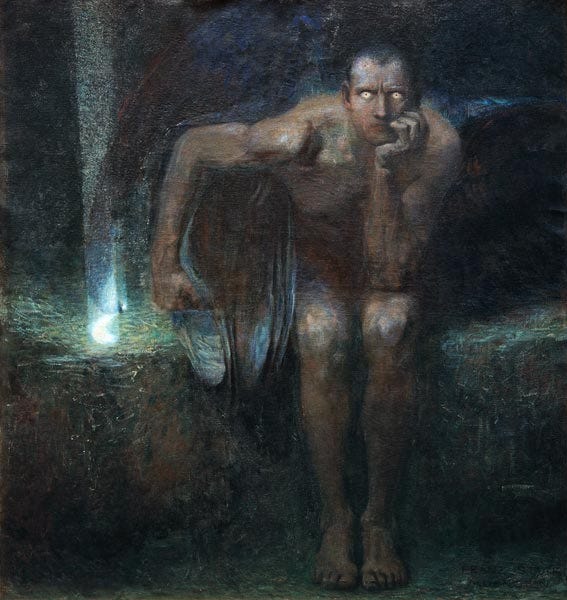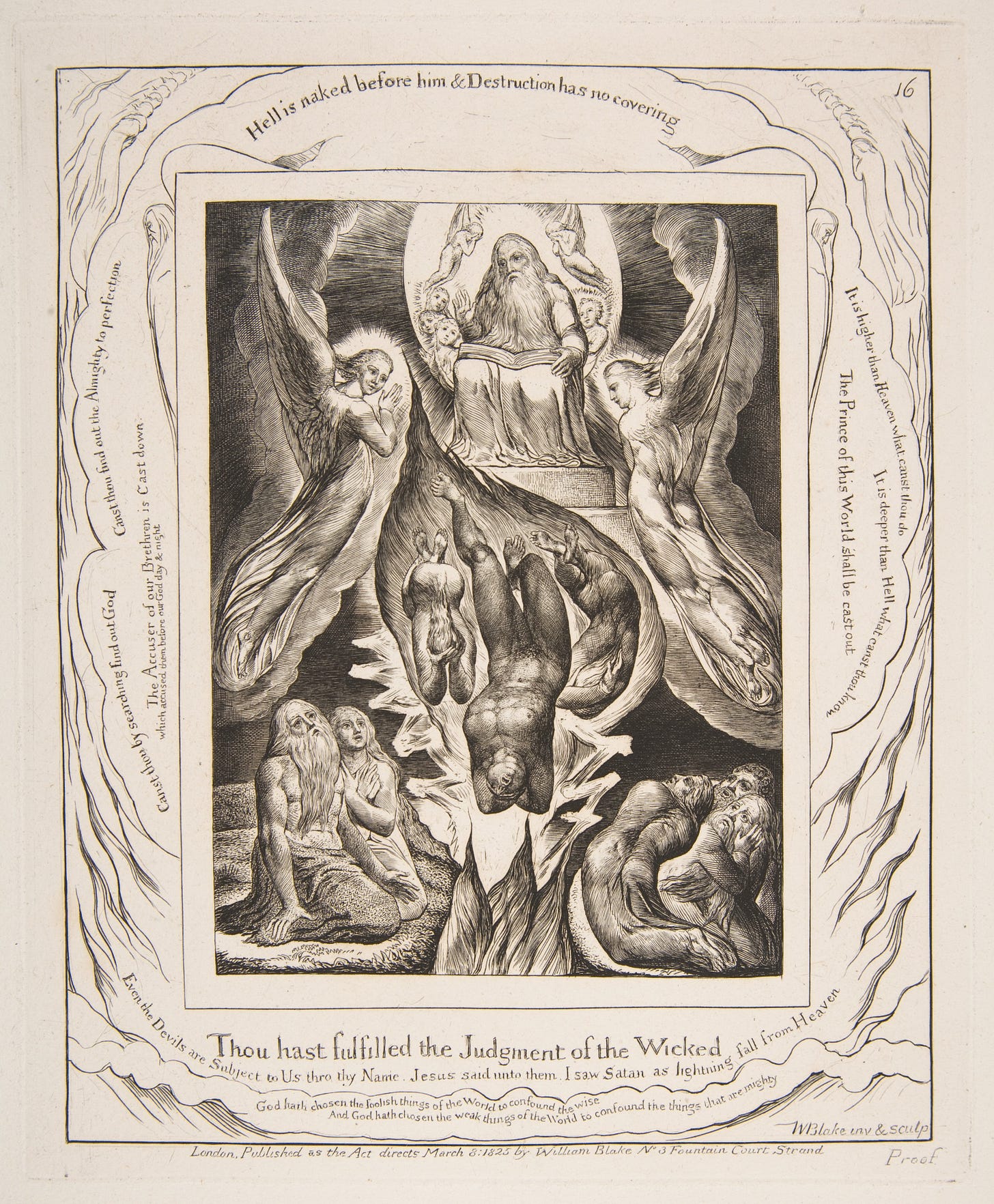Franz von Stuck - 1890
The name Lucifer, which means Light-Bearer in Latin, causes anxiety and nervousness, at the very least, and often also fear and aversion in the simple followers of the carpenter from Nazareth. To the more learned, it appears as a symbol of godless enlightenment (deception), sinful pride and blasphemous self-exaltation, i.e. the conviction that man does not need a god in his life at all. And such an attitude is a mortal sin against the divine need for totalitarian absolute power.
The name was also known in the non-Christian world.
In ancient Rome, the name Lucifer was used to denote the planet Venus, or in more poetic terms, the god of the morning star, who was the commander of the stellar legions.
The Latin poet Ovid, in his first century epic Metamorphoses, describes Lucifer as follows:
„Aurora, watchful in the reddening dawn, threw wide her crimson doors and rose-filled halls; the Stellae took flight, in marshaled order set by Lucifer who left his station last”.
However, with the advent of Christianity, traditionally, what preceded Christian religious fantasies had to be distorted and disgusted. What was natural had to be degenerated. And delusions had to be elevated to the status of revealed truth.
Christians, specialising in the manipulation and distortion of the old Hebrew scriptures in order to justify their made-up religion, promptly began to use various texts from the Hebrew scriptures out of context and present them as prophecies, for example.
Thus, the following passage from the book of Isaiah would describe Lucifer:
„How that thou didst fall from the heavens,
Shining One, Son of the Dawn?
How didst thou fall to the earth,
thou who didst conquer the nations?
Thou who spake in thy heart:
I will ascend to the heavens;
above the stars of God
I will set my throne.
I will sit on the Mount of Meeting,
at the ends of the north.
I will ascend to the tops of the clouds,
I shall be like the Most High.
What do you mean? You have been cast down to Sheol
to the very bottom of the Abyss!" Is. 14:12-15
And this is how the text reads in Latin. It is a passage from the Vulgate, the first translation of the Bible into Latin, which was produced in the 4th century AD.
The author of the translation was Saint Jerome.
12 quomodo cecidisti de caelo lucifer qui mane oriebaris corruisti in terram qui vulnerabas gentes
13 qui dicebas in corde tuo in caelum conscendam super astra Dei exaltabo solium meum sedebo in monte testamenti in lateribus aquilonis
14 ascendam super altitudinem nubium ero similis Altissimo
15 verumtamen ad infernum detraheris in profundum laci
The Latin translation of this passage uses the name Lucifer explicitly.
Isaiah's text here parallels the words attributed to Jesus about Satan:
Then he said to them: "I saw Satan falling from heaven like lightning”. - Lk. 10:18
Another Old Testament text that Christians unequivocally identify with Lucifer is this one from the Book of Ezekiel:
"Thou hast been in Eden, the garden of God; thy garments were all manner of precious stones: carnelian, topaz and jasper, chrysolite, beryl and onyx, sapphire, ruby and emerald; of gold were thy tumblers made, and thy ornaments were made in the day that thou was created. Next to the cherub who defended the entrance, I have set thee; thou hast been on the holy mountain of God, thou hast strolled in the midst of stones of fire. Impeccable were you in your conduct from the day you were created, until wickedness was discovered in you. By your extensive trade you filled your innermost being with violence and sinned. Then I drove thee from the mountain of God, and the cherub that defended the entrance drove thee out from among the stones of fire. Your heart was haughty because of your beauty. Thou didst nullify thy wisdom by the effect of thy splendour. I have cast you down to the earth; I have set you before kings to mock you."
Ezekiel 28:13-17
According to Christian theology, the above passages from the Old Testament have a double meaning. Although these passages are primarily addressed to the King of Babylon (Isaiah) and to the King of Tyre (Ezekiel), it is clear from them that they are not addressed to either man. According to theologians, Satan (Lucifer) often acts through someone. In Genesis, he speaks through the serpent (about the serpent a little more below). In Isaiah, he reigns through the king of Babylon, and in Ezekiel he captures the king of Tyre.
Another biblical passage, this time from the apocalypse of John describes the rebellion of the angels in this way:
“And there was a battle in heaven:
Michael and his angels were to fight against the Dragon.
And the Dragon and his angels came up to fight,
but he did not prevail,
and there was no more room for them in heaven.
And the great Dragon was cast down,
the Ancient Serpent,
who is called the Devil and Satan,
who deceived the whole inhabited earth,
was cast down to the earth,
and with him his angels were cast down”. Rev. 12. 7-9
William Blake (1757–1827) The Fall of Satan
Interestingly, Lucifer from the Isaiah passage, called Satan by Jesus, is here also called the Ancient Serpent .
The serpent, the perpetrator of the fall of the first humans already appears in the first book of the Bible, Genesis:
„And the serpent was more cunning than all the land animals which the Lord God had made. And he said to the woman, "Did God indeed say, Do not eat of the fruit of all the trees of the garden?" The woman answered the serpent: "The fruit of the trees of this garden we may eat; only of the fruit of the tree which is in the midst of the garden, God said, You must not eat of it, nor even touch it, lest you die." Then said the serpent to the woman, "Surely you shall not die! But God knows that when you eat of the fruit of this tree, your eyes will be opened, and like God you will know good and evil". Gen. 3. 1-5
Yahweh required blind faith from the beginning. The serpent argued that only knowledge would give understanding of the truth.
Satan, the Devil, the Dragon, the Ancient Serpent, Lucifer - some names are believed to have power.
The Bible contains the threat that one day every knee will bend at the sound of the terrible name Jesus. Probably fear is supposed to be the default state of mind of believers. In view of this, it is perhaps surprising that it is the name Lucifer that causes a negative connotation in the beleaguered people. After all, no knee will bend at the name Lucifer, because this name has the power to raise from the knees.
The Christian saviour from reality, Jesus also said this about Lucifer:
„I will no longer speak much with you, for the ruler of this world is coming. Yet he has nothing of his own in me”. - J. 14:30
Delusional believers who have trouble coming to terms with reality recognise that the one true natural world that exists for sure is ruled by Lucifer.
The real world is therefore Luciferian. The delusional heavens, on the other hand, are a divine reality.
Jesus saying: "Yet he has nothing of his own in me" as if to affirm that there is nothing real in himself.
But also a Christian could write interestingly about Lucifer.
This is what St Ambrose of Milan wrote about him in the 4th century in a work entitled: "Carmen Aurorae"
"Praeco diei iam sonat,
Noctis profundae pervigil,
Nocturna lux viantibus,
A nocte noctem segregans.
Hoc excitatus lucifer,
Solvit polum caligine,"
John A. McGuckin translates this as:
"The herald of the day now sounds,
Watchful in the depth of night,
Telling travellers that first light has come,
Cutting off each night from night.
Thereby the Bringer of Light is roused,
And frees the skies of darkness."
Lucifer frees the skies of darkness.
Satan or Lucifer are not real entities. So are God (Yahweh or any other), Christ, angels and demons. They are creations of the human mind, sometimes taking the form of delusions. Satan and Lucifer are seen by Christian theology unequivocally as one and the same being, which for them is synonymous with the enemy of their delusional god, who was the first to lose faith in god. Ecclesia Luciferi proclaims the glory of a name that has become a symbol of godlessness.
LCFNS Lucifer Nostra Salus







